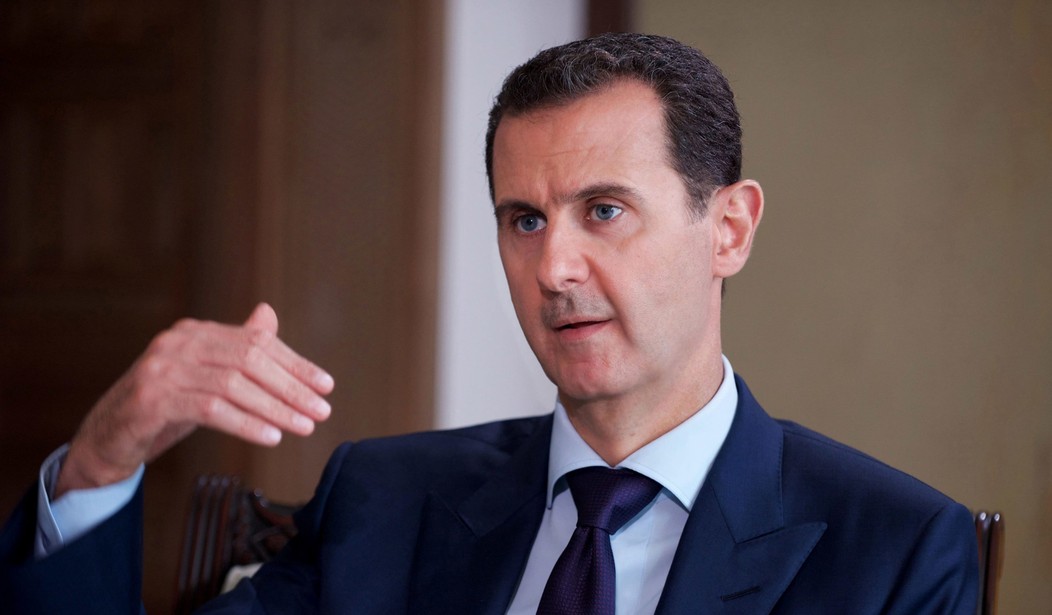WASHINGTON — The Obama administration said today that they’re supportive of an investigation into whether Bashar Assad actually turned over all of his chemical weapons — after years of White House boasting that they averted a “red line” war with Syria through the Russia-brokered deal.
The White House also insisted that the WMD disposal deal was still a success.
The deal was forged in 2013, the year after President Obama declared Assad would cross a red line requiring military response if he used his chemical weapons. Months after Obama’s threat, Assad used sarin against communities in the Ghouta region, killing hundreds of civilians.
“My decision not to conduct strikes against Syria after it used chemical weapons was controversial among some in Washington,” Obama told the graduating class at the Air Force Academy at the beginning of June. “But because we seized a diplomatic option, backed by our threat of force, nations came together and we accomplished far more than military strikes ever could have — all of Syria’s declared chemical weapons were successfully removed.”
Secretary of State John Kerry told NBC in 2014, “We struck a deal where we got 100 percent of the chemical weapons out.”
A new confidential report from the watchdog Organisation for the Prohibition of Chemical Weapons, according to Foreign Policy, found that a majority of 122 samples taken at “multiple locations” in Syria “indicate potentially undeclared chemical weapons-related activities,” with the Syrian government’s explanations for the trace nerve agents such as VX “not scientifically or technically plausible, and … the presence of several undeclared chemical warfare agents is still to be clarified.”
Asked for comment on the conclusion that Assad held onto some chemical weapons, White House press secretary Josh Earnest told reporters today that “obviously this is something that the OPCW has been carefully looking at and we believe that they should.”
“What we were able to achieve a couple of years ago in getting the Assad regime to acknowledge that they had a significant quantity of chemical weapons, rounding up those chemicals and destroying them, made the world safer. It eliminated a significant proliferation risk,” Earnest said.
“We have a country that is overrun by extremists. Having large quantities of chemical weapons floating around is not a good idea and not a good combination. So we’ve been pleased that the Assad regime’s declared chemical weapons stockpile was rounded up and destroyed. But the situation in Syria has been murky for quite some time.”
Earnest added that the administration has “expressed our previous, long running concerns about the gratuitous violence that’s used by the Assad regime against innocent civilians, including the weaponization of otherwise common chemicals to try to exacerbate the violence in that country.”
“And I’m referring to chlorine, a commonly available industrial chemical that, according to some reports at least, the Assad regime is using as a weapon,” he said. “And that is a — something that’s a deep concern to the international community and certainly to the United States.”
National Security Council spokesman Ned Price later responded to the United Nations and OPCW investigation into the use of chemical weapons in 2014 and 2015 attacks on civilians by Assad (chlorine gas) and ISIS (mustard gas).
“In 2013, the Syrian regime agreed to the removal and destruction of its chemical weapons and also joined the Chemical Weapons Convention,” Price acknowledged. “While chlorine has legitimate, peaceful uses, the Chemical Weapons Convention bans its use as a weapon.”
“The United States will work with our international partners to seek accountability through appropriate diplomatic mechanisms, including through the United Nations Security Council and the OPCW. We urge all UN member states and parties to the Chemical Weapons Convention, including Russia and Iran, to participate in this effort.”
Price did not address the reported discovery of nerve agents by inspectors.
“The findings by the UN and the OPCW present yet another opportunity for all nations to speak with one voice to address these heinous crimes and to make it clear that the use of chemical weapons is intolerable,” he added.









Join the conversation as a VIP Member